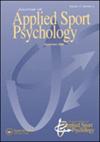How elite endurance athletes experience and manage exercise-induced pain: Implications for mental performance consultants
IF 2.7
2区 心理学
Q2 HOSPITALITY, LEISURE, SPORT & TOURISM
引用次数: 1
Abstract
Abstract There is a paucity of research examining exercise-induced pain (EIP) management in elite endurance sports. The purpose of this study was therefore to investigate how elite endurance athletes experience and manage EIP to help inform the work of Mental Performance Consultants. Individual semi-structured interviews were conducted with 12 female and three male athletes (Mage = 23.73, SD = 2.31) competing in track and field (i.e., 600–1,500 m; n = 5), swimming (i.e., 200–400 m; n = 5), and canoe kayak (i.e., 500–1,000 m; n = 5). Given the centrality of self-regulation in elite sports and in the management of internal states (e.g., EIP), the social cognitive model of self-regulation was used to guide this study and to derive practical implications. The template analysis generated (a) two themes (i.e., sensations, beliefs) and six subthemes (e.g., tightness, progressive) related to the experience of EIP as well as (b) three themes (i.e., preparation, execution, evaluation) and 17 subthemes (e.g., accept and commit to EIP, direct attention away from EIP, reflect using a training journal) related to the management of EIP. Findings suggest that the experience of EIP is highly cognitive and generally perceived as detrimental to performance if not effectively managed. Athletes used several psychological strategies to prepare to experience EIP, reduce the aversive effects of EIP while performing, and learn from their EIP management strategies to improve their coping capacity. Importantly, combining self-regulation and mindfulness strategies appears to be valuable to successfully manage EIP. Lay summary: This study examined how elite track and field, swimming, and canoe kayak athletes experience and manage exercise-induced pain when training at a high intensity and competing. Beliefs and sensations influenced the experience of EIP and athletes used 17 psychological strategies to manage this prominent psychological demand. IMPLICATIONS FOR PRACTICE Mental Performance Consultants are encouraged to: Emphasize the development of preparation strategies to manage EIP as this phase seems to be a priority. Specifically, accepting and committing to experiencing EIP appears to be essential. Help endurance athletes focus on performance-relevant cues (e.g., cadence, technique, relaxing, race plan) and the present moment (e.g., one repetition/segment at a time) when experiencing EIP. Develop a brief guided self-reflection tool that endurance athletes can use to assess the experience and management of EIP.优秀的耐力运动员如何体验和管理运动引起的疼痛:对心理表现咨询师的影响
关于精英耐力运动中运动性疼痛(EIP)管理的研究很少。因此,本研究的目的是调查优秀耐力运动员如何体验和管理EIP,以帮助心理表现顾问的工作。对参加田径(即600 - 1500米;N = 5),游泳(即200-400米;N = 5),独木舟皮艇(即500-1,000米;n = 5)。鉴于自我调节在精英体育和内部状态管理(如EIP)中的中心地位,自我调节的社会认知模型被用来指导本研究并得出实际意义。模板分析生成了与EIP体验相关的(a)两个主题(即感觉、信念)和六个副主题(如紧绷性、递进性),以及与EIP管理相关的(b)三个主题(即准备、执行、评估)和17个副主题(如接受和承诺EIP、将注意力从EIP转移开、使用培训日志反映)。研究结果表明,EIP的体验是高度认知的,如果不能有效管理,通常会被认为对表现有害。运动员运用多种心理策略为体验EIP做准备,在执行过程中减少EIP的厌恶效应,并借鉴其EIP管理策略来提高应对能力。重要的是,结合自我调节和正念策略似乎对成功管理EIP很有价值。概要:本研究考察了优秀的田径、游泳和皮划艇运动员在高强度训练和比赛时如何经历和管理运动引起的疼痛。信念和感觉影响着EIP体验,运动员使用了17种心理策略来管理这种突出的心理需求。对实践的启示心理绩效咨询师被鼓励:强调准备策略的发展,以管理EIP,因为这一阶段似乎是优先考虑的。具体来说,接受并承诺体验EIP似乎是必不可少的。帮助耐力运动员在体验EIP时专注于与表现相关的线索(例如,节奏、技术、放松、比赛计划)和当下(例如,一次一个重复/片段)。开发一个简短的指导自我反思工具,耐力运动员可以使用它来评估EIP的经验和管理。
本文章由计算机程序翻译,如有差异,请以英文原文为准。
求助全文
约1分钟内获得全文
求助全文
来源期刊
CiteScore
6.90
自引率
9.40%
发文量
39
审稿时长
>12 weeks
期刊介绍:
The Journal of Applied Sport Psychology (JASP) is a refereed journal designed to significantly advance thought, theory, and research on applied aspects of sport and exercise psychology. Submissions such as experimental studies, qualitative research, correlational studies, case studies, position papers, critical reviews, theoretical developments specific to applied research conducted in sport and/or exercise settings, or having significant applied implications to sport and exercise, are appropriate content for the JASP. Please see the recent Editorial for further details on the aims and scope of the journal. JASP is a non-proprietary journal that is an official publication of the Association for Applied Sport Psychology (AASP). The purpose of AASP is to promote the development of psychological theory, research, and intervention strategies in sport and exercise psychology. The Journal is a direct benefit of membership in AASP and is received by its student and professional members. The publisher of the JASP is Taylor and Francis, Inc. of Philadelphia, PA.

 求助内容:
求助内容: 应助结果提醒方式:
应助结果提醒方式:


